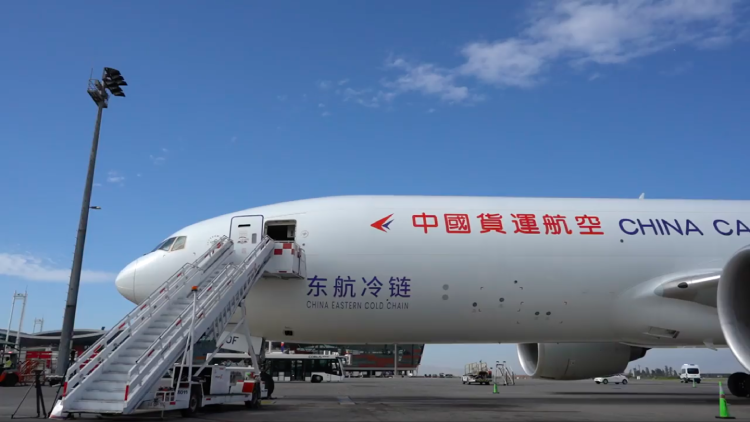Chinese cargo airlines are gearing up for more imports from Latin America and Caribbean (LAC) countries, as mutual benefits and win-win results are regarded as the overarching principles for the development of relations between China and the region, underlying the highly complementary nature of the economies of both sides.
At 10:50 am on Wednesday, a freighter from China Eastern Air Logistics carrying 76 tons of fresh Chilean cherries arrived at Shanghai Pudong International Airport from Santiago, the capital of Chile, after a 25-hour journey of 19,300 kilometers.
The flight came after two leaders of China and Chile met on the sidelines of the APEC Economic Leaders’ Meeting on Friday (local time), as the two countries vowed to expand bilateral cooperation to more sustainable and broader areas with high-level free trade and more open industrial policies.
It has been 10 years since the logistics company started to transport cherries with all-cargo freighter planes from the South American market.
Over the past decade, through thousands of all-cargo flights, ordinary commercial flights and ships, China Eastern said that the logistics arm has imported more than 50,000 tons of Chilean cherries, salmon and other agricultural products with a value of more than $1 billion.
The varieties of food imported by China Eastern from Chile have increased from the original cherries to more than 10 items including salmon, blueberries and plums. Salmon has been imported all year round.
China Eastern Air Logistics has become an important supply chain solutions provider for Chilean air-freighted cherries and the largest importer of salmon in China, according to the statement sent to the Global Times on Wednesday.
In the 2024-25 South American cherry production season, China Eastern said the logistics arm plans to import about 12,000 tons of Chilean cherries, of which 5,500 tons will be imported by air and 6,500 tons by sea.
China Eastern is not alone. Cainiao, the logistics arm of China’s e-commerce heavyweight Alibaba, told the Global Times that it has eight cargo charter flights that connect China and Brazil every week, with an average weekly cargo volume of more than 800 tons.
In addition to transporting parcels from cross-border e-commerce platforms, it also serves the export needs of Chinese companies to Brazil’s B2B sector.
In April last year, Cainiao signed a strategic partnership with Brazil Post, the national postal service of Brazil, to deepen collaboration in international express and logistics technology. The two companies will carry out cooperation in fields such as global air cargo, local logistics infrastructure and digital logistics technology.
China believes that trade in goods between China and LAC economies will continue to grow at a high speed and achieve win-win results at a higher level, Lin Jian, a Foreign Ministry spokesperson, said on November 14…



